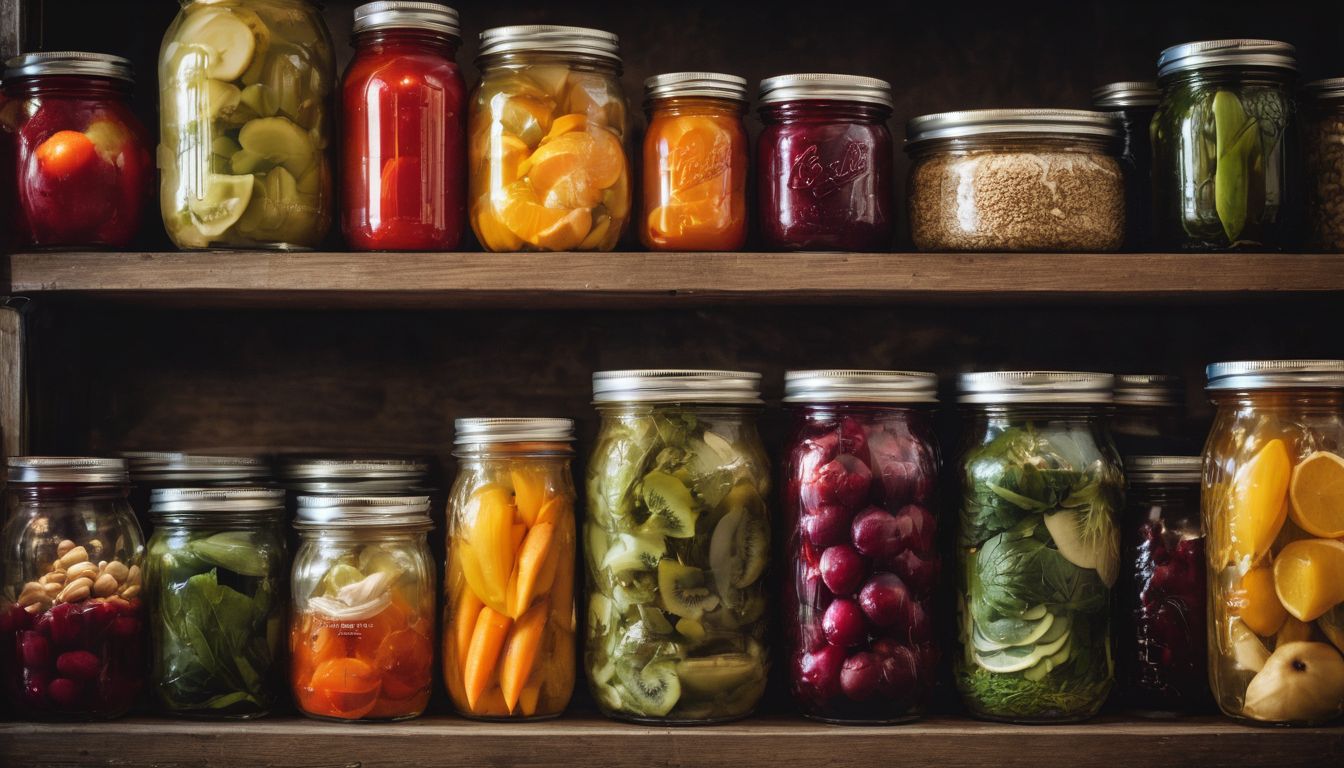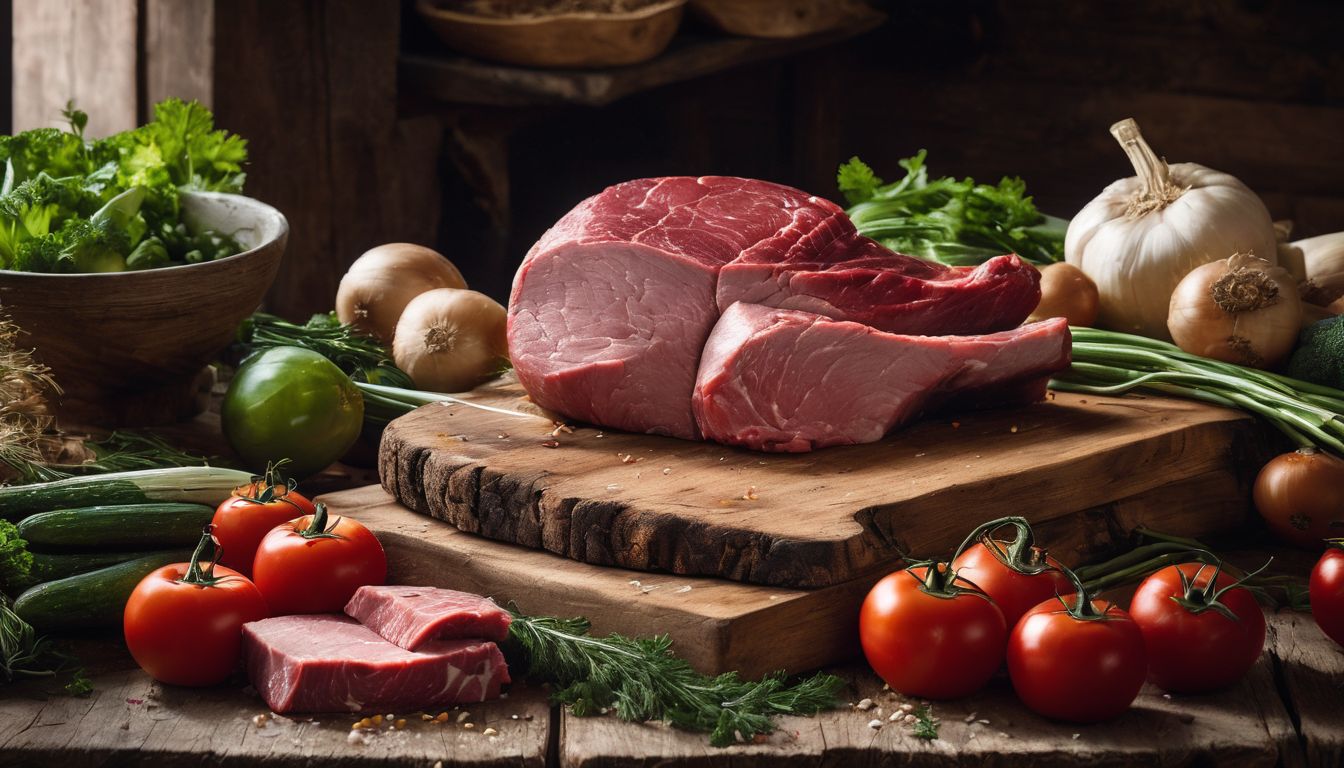Deciding what to eat can be tricky if you’re avoiding gluten. Gluten is a protein found in wheat, barley, and rye that can cause health issues for some people. Our guide busts common myths and lays out the real facts about gluten-free eating, making it simpler for you.
Uncover the truth below!
Key Takeaways
- Gluten is a protein in wheat, barley and rye that some people need to avoid due to health conditions like celiac disease or gluten sensitivity.
- Many myths about gluten and gluten-free eating are false; for example, not all gluten-containing foods cause weight gain, and you can’t diagnose sensitivity with just any test.
- Transitioning to a gluten-free diet involves learning which foods are safe, reading food labels carefully, and being cautious of cross-contamination.
- Celiac Disease Centres offer support for those needing a gluten – free diet by providing information on managing the condition effectively.
- It’s important to seek accurate information about gluten – free living as it impacts personal health as well as environmental sustainability.
What is Gluten and Why do People Avoid it?
Moving from the broader context of gluten-free eating, let’s dive into what gluten actually is. Gluten is a protein found in wheat, barley, and rye grains. It gives bread its stretchy texture and helps dough rise by trapping gas bubbles during fermentation.
Some people avoid gluten for health reasons such as coeliac disease or non-coeliac gluten sensitivity. Coeliac disease is an autoimmune disorder where the ingestion of gluten leads to damage in the small intestine.
Those with this condition must follow a strict gluten-free diet to prevent serious health complications.
Others may choose to cut out gluten due to a perceived increase in overall wellbeing or digestive comfort. However, not everyone needs to shun these proteins; people without any intolerance can digest them without issue.
For environmentally conscious individuals, it’s vital to know that following a special diet like this also means considering the environmental impact of food choices and packaging typically associated with specialised diets.
Myths About Gluten
– There are many myths about gluten, such as the belief that all gluten-containing foods are bad for you and that eating gluten causes weight gain. Additionally, some people think that using gluten-free shampoo and cosmetics is necessary if you have a sensitivity to gluten, or that it can be diagnosed through tests.
Gluten-Containing Foods are Bad for You
Gluten-containing foods can be harmful if you have celiac disease or a gluten intolerance. These foods trigger an immune response in the body, causing damage to the small intestine and leading to various health issues.
Consuming gluten when you have a sensitivity can result in symptoms such as bloating, diarrhea, fatigue, and nutrient deficiencies that can impact your overall well-being. It’s important for those who are sensitive to gluten to avoid these foods to maintain good health and prevent long-term complications.
Switching to a gluten-free diet is crucial for individuals with celiac disease or gluten intolerance. By eliminating gluten-containing foods from their diet, they can effectively manage their condition and reduce the risk of associated health problems.
Making informed food choices and being mindful of ingredient labels will help ensure a healthy lifestyle without compromising on taste or nutrition.
Eating Gluten Causes Weight Gain
Many people believe that eating gluten causes weight gain, but the truth is more complex. Gluten itself doesn’t directly cause weight gain; rather, it’s the high-calorie and often processed nature of many gluten-containing foods that can contribute to weight gain.
Foods like pastries, cakes, and fried foods are often high in gluten and are also high in calories, unhealthy fats, and sugar – all contributing factors to potential weight gain.
Understanding the relationship between gluten and weight gain is important for those considering a gluten-free diet as a means of managing their weight or overall health. It’s essential to focus on consuming whole and unprocessed foods regardless of whether they contain gluten or not, as these choices have been associated with better overall health outcomes.
Eating Gluten is Unhealthier
Contrary to popular belief, eating gluten does not necessarily equate to an unhealthy diet. In fact, for individuals without celiac disease or a diagnosed gluten sensitivity, cutting out gluten-containing foods can lead to a lack of essential nutrients and fiber in the diet.
It is important for environmentally conscious individuals to be discerning about their dietary choices and not simply follow trends blindly. Instead, focus on consuming a well-balanced diet with naturally derived ingredients that support personal health as well as environmental sustainability.
Furthermore, it’s crucial to consider the wider impact of food choices on the environment and various ecosystems when making decisions about dietary restrictions. By promoting awareness around sustainable farming and ethical agriculture practices, environmentally conscious individuals can contribute positively to both personal health and conservation efforts.
You Can Diagnose Gluten Sensitivity Through Tests
Contrary to popular belief, diagnosing gluten sensitivity isn’t as simple as taking a single test. However, specialised blood tests and intestinal biopsies can help determine if you have coeliac disease or non-coeliac gluten sensitivity.
Blood tests look for specific antibodies that your body produces in response to gluten intake. Additionally, genetic testing may be used to confirm a predisposition to coeliac disease.
It’s important to consult with a healthcare professional before undergoing any diagnostic tests for gluten-related disorders. A thorough evaluation of symptoms and medical history is crucial in determining the appropriate course of action for accurate diagnosis and treatment.
You Should Only Use Gluten-Free Shampoo and Cosmetics
When choosing shampoo and cosmetics, it’s important to opt for gluten-free options. Many conventional shampoos and cosmetics contain wheat-derived ingredients which may cause a reaction in individuals with gluten sensitivity or coeliac disease.
By selecting gluten-free products, you can avoid potential skin irritation or ingestion of gluten through accidental contact.
To ensure your beauty routine aligns with your gluten-free lifestyle, look for products that are specifically labelled as “gluten-free”. This can help minimise the risk of exposure to gluten and support your commitment to a gluten-free diet.
Gluten Sensitivity is a Common Form of Celiac Disease
Gluten sensitivity is a prevalent type of celiac disease affecting many individuals. It causes an abnormal immune system reaction to gluten, resulting in damage to the small intestine.
Symptoms include diarrhea, fatigue, and weight loss due to malnutrition caused by poor absorption of nutrients. It’s important for those with gluten sensitivity or celiac disease to maintain a strict gluten-free diet, eliminating wheat, barley, and rye from their meals to prevent discomfort and further health issues.
Individuals living with gluten sensitivity should be cautious about cross-contamination when cooking or eating out. Gluten-free options for cosmetics and personal care products are not necessary unless there is accidental ingestion through lip balms or lotions used near the mouth.
Facts About Gluten-Free Eating
Celiac Disease Centers and Resources are available to help you get started on a gluten-free diet, providing information on causes, symptoms, and treatment. To learn more about the latest news and findings in gluten-free eating, keep reading!
Celiac Disease Centers and Resources
Coeliac disease centres and resources cater to individuals with gluten-related health concerns, providing essential support and information. These facilities offer diagnosis, treatment, and ongoing management for those diagnosed with coeliac disease or gluten intolerance.
Furthermore, they provide access to a range of resources such as dietary advice, gluten-free recipes, products, and cooking tips to help individuals maintain a gluten-free lifestyle effectively.
Patients can also benefit from educational materials on cross-contamination prevention, enzymes that aid in digestion of gluten or wheat-based products. Additionally, these centres conduct research to advance understanding and management of coeliac disease while supporting environmental sustainability through promoting sustainable food choices within the context of a gluten-free diet.
Getting Started on a Gluten-Free Diet: A Step-By-Step Guide
Transitioning from understanding coeliac disease to starting a gluten-free diet, it’s essential to take practical steps towards a healthier lifestyle. Here is a step-by-step guide to help you get started:
- Familiarise Yourself with Gluten-Free Foods: Begin by identifying naturally gluten-free foods such as fruits, vegetables, meats, and dairy products.
- Learn to Read Food Labels: Look out for ingredients like wheat, barley, rye, and malt. Also, be wary of potential cross-contamination in processed foods.
- Clean Out Your Pantry: Remove any foods that contain gluten to prevent accidental consumption.
- Research Gluten-Free Recipes: Explore various recipes that accommodate your dietary needs and fit your taste preferences.
- Find Gluten-Free Substitutes: Replace gluten-based products with alternatives like quinoa, rice flour, and almond flour for cooking and baking.
- Seek Support: Connect with local or online support groups dedicated to living a gluten-free lifestyle for advice and encouragement.
- Consult a Registered Dietitian: A professional can provide personalised guidance on planning balanced meals and avoiding nutrient deficiencies on a gluten-free diet.
- Experiment Slowly: Gradually implement changes to assess how your body responds to the new diet.
- Stay Informed: Keep up-to-date with the latest information on gluten-free living through reliable sources and publications.
- Embrace the Journey: Approach the transition positively and view it as an opportunity to explore new culinary experiences while nurturing your well-being.
Celiac Disease: Causes, Symptoms, and Treatment
Celiac disease occurs due to an abnormal immune response to gluten, a protein found in wheat, barley, and rye. The body’s reaction to gluten damages the small intestine’s lining, hindering nutrient absorption.
Symptoms include digestive issues, fatigue, joint pain, skin rash, and even depression. Treatment involves adhering strictly to a gluten-free diet. A dietitian or nutritionist can help create a balanced meal plan while avoiding cross-contamination of gluten-containing foods in the kitchen.
Maintaining a strict gluten-free lifestyle is crucial in managing celiac disease effectively. Look for certified gluten-free products and recipes that support sustainable practices while ensuring dietary requirements are met.
The Latest News and Findings
COVID-19, flu, and RSV rates are on the decline, offering some relief for those concerned about respiratory illnesses. Additionally, there has been a recall of Robitussin cough syrups due to microbial contamination.
COVID-19, Flu, and RSV Rates on the Decline
COVID-19, flu, and RSV rates are declining. This positive trend is good news for everyone concerned about public health. The decrease in these illness rates contributes to a healthier environment overall, as it means reduced demand on medical resources and a lower risk of contamination.
Recall of Robitussin Cough Syrups for Microbial Contamination
Robitussin Cough Syrups have been recalled due to microbial contamination. The recall is crucial for public safety and aligns with the commitment to environmental health and safety.
It’s essential to stay informed about product recalls like this one, as they directly impact consumer well-being.
Being conscious of such issues ensures the promotion of a sustainable environment for future generations. Now, let’s delve into tips for maintaining a successful gluten-free diet.
Tips for a Successful Gluten-Free Diet
Discover the truth about gluten with Myth Busters: Gluten-Free Edition by Alice Bast. Learn about the best breakfasts for weight loss and the scientific truth about controversial foods and drinks.
Myth Busters: Gluten-Free Edition by Alice Bast
- Gluten Sensitivity is Not Always Coeliac Disease:
- Gluten-Free Diets Can Lack Essential Nutrients:
- Cross-Contamination Risks in Food Preparation:
- The Need for Label Reading:
- Advocacy for Accessible Gluten-Free Options:
15 Myths About Gluten to Stop Believing
15 Myths About Gluten to Stop Believing
- Gluten-Containing Foods are Bad for You: Gluten is not inherently harmful; it only poses a threat to those with gluten-related disorders.
- Eating Gluten Causes Weight Gain: Weight gain due to gluten consumption is not universal and can be attributed to overall diet and lifestyle.
- Eating Gluten is Unhealthier: A balanced diet that includes gluten-containing foods can be perfectly healthy for many people.
- You Can Diagnose Gluten Sensitivity Through Tests: Diagnosing non-celiac gluten sensitivity isn’t straightforward and often requires an elimination diet.
- You Should Only Use Gluten-Free Shampoo and Cosmetics: While important for those with celiac disease, it’s not necessary for everyone following a gluten-free diet.
- Gluten Sensitivity is a Common Form of Celiac Disease: Gluten sensitivity and celiac disease are distinct conditions with different implications for health.
- Celiac Disease Centers and Resources
- Getting Started on a Gluten-Free Diet: A Step-By-Step Guide
- Celiac Disease: Causes, Symptoms, and Treatment
- The Latest News and Findings
- COVID – 19, Flu, and RSV Rates on the Decline
- Recall of Robitussin Cough Syrups for Microbial Contamination
- Tips for a Successful Gluten – Free Diet
- Myth Busters: Gluten-Free Edition by Alice Bast
- The Truth About Gluten: Myths and Facts
The Truth About Gluten: Myths and Facts
Gluten is a protein found in wheat, barley, and rye. Many people believe that all gluten-containing foods are inherently unhealthy, but this is not true. In fact, whole grain products containing gluten can be beneficial for health as they provide essential nutrients like fiber and B vitamins.
Another common myth is that eating gluten causes weight gain. However, weight gain associated with gluten stems from consuming high-calorie processed foods rather than the gluten itself.
It’s also important to note that self-diagnosing gluten sensitivity through tests isn’t reliable; consulting a healthcare professional for proper diagnosis is crucial.
Moving on to facts about gluten-free eating.. Celiac Disease Centers and Resources can provide invaluable support for those with celiac disease or gluten sensitivities when adopting a gluten-free diet.
The Best Breakfasts for Weight Loss
Transitioning from separating gluten myths and facts to exploring the best breakfasts for weight loss is crucial for maintaining a healthy diet. Starting your day with a nutritious and balanced breakfast lays the foundation for sustaining energy levels throughout the day, aiding in successful weight management.
A well-thought-out morning meal that incorporates whole grains, lean proteins, and healthy fats can kickstart your metabolism and keep you feeling full until lunchtime. Making mindful choices at breakfast can set the tone for making healthier decisions throughout the day.
The Best and Worst Diets for Sustained Weight Loss
Transitioning from choosing the best breakfasts for weight loss to finding sustainable weight loss diets, it’s essential to make informed choices. The best diets for sustained weight loss often focus on whole, nutrient-dense foods such as fruits, vegetables, lean proteins, and healthy fats.
Incorporating gluten-free options into these diets can be beneficial for individuals with allergies or sensitivities. However, it’s crucial to beware of potentially unhealthy processed gluten-free products that may contain excessive sugar and additives.
Understanding the impact of different diets on both personal health and environmental conservation is key in making informed dietary decisions.
Considering the environmental impact of various diet choices is vital when aiming for sustained weight loss. Opting for whole food-based diets that prioritise locally sourced produce can not only benefit personal health but also support environmentally conscious practices by reducing carbon footprint associated with food transportation.
The Scientific Truth About Controversial Foods and Drinks
Transitioning from debunking myths about gluten, it’s important to understand the scientific truth about controversial foods and drinks. As an environmentally conscious individual, you may be interested in the impact of certain food and drink choices on the environment.
Understanding the science behind these controversial items can empower you to make informed decisions that align with your values.
Processed foods, sugary beverages, and genetically modified organisms are often subject to controversy due to their potential health and environmental impacts. By staying up-to-date with scientific research and understanding the facts behind these controversies, you can make sustainable choices that support both your well-being and environmental conservation efforts.
Conclusion
In conclusion, educating oneself about gluten and knowing the myths from the facts is crucial. Making informed choices leads to a successful gluten-free lifestyle. Exploring recipes and products while being aware of cross-contamination ensures an enjoyable gluten-free experience.
Taking steps towards understanding gluten-related conditions supports both personal well-being and environmental consciousness.
FAQs
1. What exactly is a gluten-free diet?
A gluten-free diet means eating meals that do not contain gluten, which is found in wheat and other grains. It involves choosing gluten-free products and recipes for your daily meals.
2. Who should follow a gluten-related free lifestyle?
People with celiac disease or wheat allergy often adopt a gluten-free lifestyle to avoid health issues caused by eating foods that contain gluten.
3. How can I make sure my cooking is truly gluten-free?
To ensure your cooking is indeed free from cross-contamination, always use clean utensils and surfaces, along with ingredients certified as ‘glutenfree’ when preparing recipes.
4. Can you find plenty of options when following a wheat allergy-friendly diet?
Yes! Many shops offer an array of tasty and diverse gluten-free products suitable for individuals observing a strict diet due to wheat allergies or other reasons.





